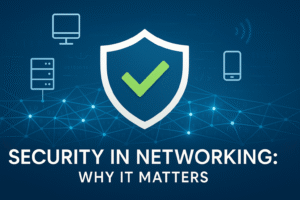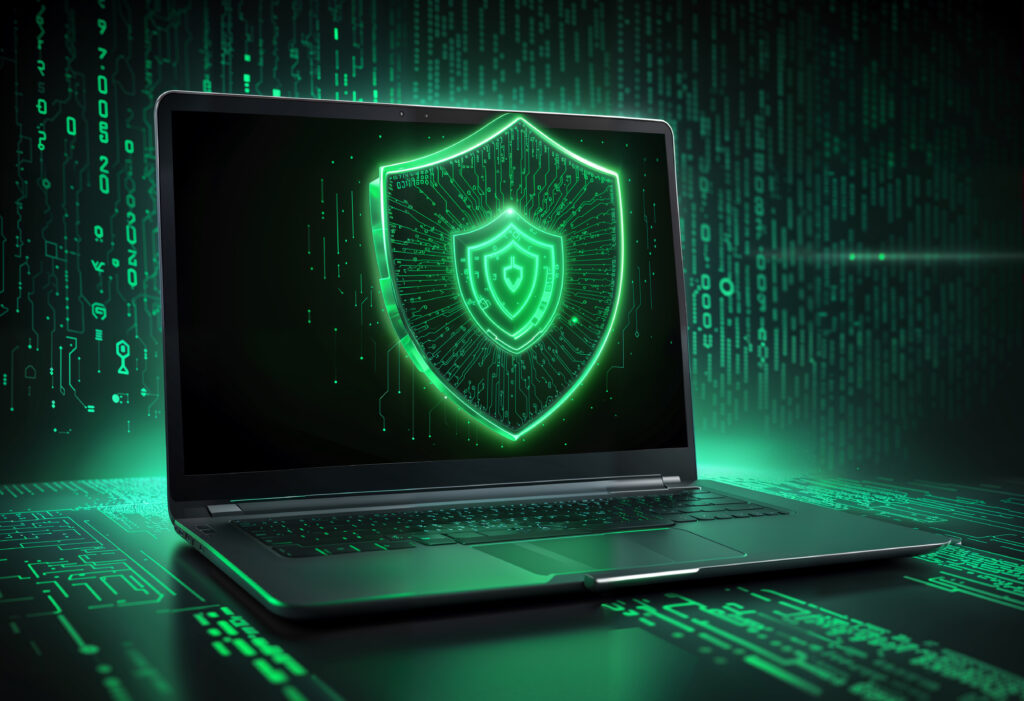
In Miami, securing your business’s digital assets requires expert Miami network security and reliable Miami cybersecurity services. Ciegate Technologies specializes in IT security Miami FL, delivering tailored solutions that protect your data and ensure compliance. Our Miami network security consultants provide comprehensive cybersecurity audits Miami to identify vulnerabilities and strengthen your defenses.
With Ciegate, your business benefits from advanced business security Miami measures, including firewall protection, malware detection, encryption technology, and access control. We focus on Miami data protection and provide managed security services designed to prevent breaches and minimize downtime. Trust Ciegate for local, professional cyber defense and network security Miami expertise that keeps your operations safe and compliant.
This article explores in depth why network security is fundamental, the risks of neglecting it, and key strategies to implement it effectively. From protectingcritical data to complying with global regulations, we will discover how a secure network not only safeguards assets but also drives growth and innovation.
The Digital Context: Why Networks Are the Heart of the Modern Era
Before diving into the importance of network security, it is crucial to understand the central role networks play in today’s society. From small
businesses to multinational corporations, networks are the nervous system that connects devices, applications, users, and data. Consider:
Businesses
- Corporate networks enable real time collaboration, access to cloud resources, operations management, and communication with customers and suppliers.
Individuals
- Social media, streaming services, online banking, and e-commerce depend on secure connections to function without interruptions.
Critical Infrastructure
- Healthcare, energy, transportation, and government systems rely on networks to operate efficiently and safely.
With the rise of remote work, the Internet of Things (IoT), and widespread cloud adoption, the number of devices connected to networks
has exploded. According to Statista, the number of IoT devices is projected to reach 29.4 billion by 2030. This growth, however, is accompanied
by an exponential increase in vulnerabilities.
The Vital Importance of Security in Networking: 7 Reasons You Can’t Ignore
1.1. Protecting Sensitive Data: The Digital Treasure of Organizations
In today’s digital age, data is often considered the most valuable asset for organizations. A notable example of the consequences of inadequate network security is the 2021 attack on Colonial Pipeline, one of the largest fuel companies in the miami. Hackers gained access to the company’s network, leading to a devastating $4.4 million ransom demand and causing a significant disruption in fuel distribution along the East Coast.
This incident underscores the critical importance of network security in safeguarding sensitive data. Key measures such as encrypting data, both in transit
(while being transmitted over the network) and at rest (stored on servers), are fundamental to protecting information confidentiality. Protocols like Transport Layer Security (TLS) and Advanced Encryption Standard (AES) are essential tools in this regard, ensuring that data remains secure from unauthorized access and potential breaches.

1.2. Minimizing Downtime: Productivity Cannot Stop
Network security is also crucial for minimizing downtime, which can severely impact productivity and operational efficiency. Cyberattacks, such as ransomware (which blocks access to data in exchange for a ransom) and distributed denial-of-service (DDoS) attacks (which flood a network with fake traffic), can paralyze a company’s operations. According to a Downdetector report from 2023, 40% of businesses experienced at least one network outage lasting more than an hour, with an average cost of $5,600 per minute of downtime.
A secure network with firewall protection, intrusion detection systems (IDS), and a comprehensive incident response plan significantly reduces the risk of disruptions. Implementing network segmentation—dividing the network into isolated subnets—helps contain attacks to specific areas, protecting sensitive data and ensuring business continuity. Miami cybersecurity services and IT security Miami FL providers recommend these managed security services to maintain productivity and strengthen overall cyber defense.
1.3. Regulatory Compliance: Avoiding Fines and Legal Damage
Adhering to regulatory requirements is another vital aspect of network security. Numerous regulations mandate that organizations implement robust security measures to protect data privacy. The General Data Protection Regulation (GDPR) in the European Union, for example, requires companies to protect the data of European citizens, with fines of up to 4% of global revenue for non-compliance. In the U.S.,the Health Insurance Portability and Accountability Act (HIPAA) regulates the security of health information, necessitating access controls, encryption
and network audits. Similarly, the Payment Card Industry Data Security Standard (PCI DSS) mandates firewalls, encryption, and network monitoring for companies handling credit cards to prevent fraud.
Ignoring these regulations not only exposes businesses to hefty fines but also risks damaging their brand reputation, making network security an indispensable component of modern business operations.
1.4. Mitigating Financial Losses: The Cost of Negligence
Cyberattacks pose a significant threat not only to the operational integrity of a business but also to its financial health. According to the National Institute of Cybersecurity (INCIBE), the financial impact of a cyberattack can be devastating, with the average cost for a small business reaching $200,000, while for large companies, it can exceed $1 million. These costs are multifaceted, encompassing both direct and indirect expenses.
Direct costs include ransoms paid to attackers, expenses for data recovery, and the costs associated with repairing compromised systems. Indirect costs, however, can be even more detrimental, as they involve the loss of customers, damage to brand reputation, and substantial legal and public relations expenses. Investing in robust network security is, therefore, of paramount importance, as it represents a long-term saving that can prevent these financial pitfalls and ensure business continuity.
1.5. Preserving Reputation: Trust Is Irreplaceable
The repercussions of a data breach extend far beyond immediate financial losses, causing lasting damage to a company’s reputation and customer trust. According to a PwC study, 87% of consumers would abandon a brand if their data was compromised. A clear example is the 2017 Equifax breach, which exposed personal data of 147 million people. The aftermath included numerous lawsuits, $700 million in fines, and a 30% drop in stock value. This highlights the critical need for robust Miami network security and Miami cybersecurity services to protect sensitive data, maintain customer trust, and safeguard business reputation.
incurring $700 million in fines, and experiencing a 30% drop in stock value within a month. A secure network not only protects sensitive data but also demonstrates a commitment to privacy and security, which is crucial for building and maintaining customer loyalty. In an era where data privacy is a top concern for consumers, a strong security posture can be a key differentiator in preserving a company’s reputation.
1.6. Preventing Unauthorized Access: The Invisible Enemy
Networks are a prime target for a variety of malicious actors, including hackers, malicious insiders (such as employees or former employees with access), and ransomware groups. Without adequate security measures, these attackers can exploit vulnerabilities to gain unauthorized access. They can steal credentials through phishing attacks, which use fake emails to mimic trusted companies, or through brute-force attacks, where attackers try thousands of password combinations to gain entry.
Once inside, they can install malware, which can spy on activities, steal data, or damage systems. Additionally, attackers can escalate privileges, gaining access to restricted areas of the network, such as database servers or industrial control systems, which can have catastrophic consequences. A key measure to prevent such unauthorized access is the implementation of multi-factor authentication (MFA), which requires not just a password but also an additional form of verification, significantly enhancing security.

1.7. Enabling Digital Transformation: The Future Depends on Secure Networks
Adopting technologies such as cloud computing, IoT, artificial intelligence (AI), and 5G is essential for digital transformation and business innovation. However, these advancements increase the network security risks by expanding the attack surface.
For example, 94% of businesses use cloud services, but 45% of cloud-stored data remains unencrypted, exposing critical information. Additionally, IoT devices like security cameras, smart thermostats, and industrial sensors often have weak default passwords or outdated software, creating vulnerabilities that attackers can exploit. Strengthening Miami network security and utilizing Miami cybersecurity services is crucial to protect these technologies and ensure safe digital transformation.
1.7. Enabling Digital Transformation:
The Future Depends on Secure Networks: To protect a network, it is not enough to install a firewall and forget about it. A comprehensive approach is required that combines technology, processes, and people. Here are the pillars:
2.1. Firewalls: The First Line of Defense
Adopting technologies such as cloud computing, IoT, artificial intelligence (AI), and 5G is essential for digital transformation and business innovation. However, these advancements increase the network security risks by expanding the attack surface.
For example, 94% of businesses use cloud services, but 45% of cloud-stored data remains unencrypted, exposing critical information. Additionally, IoT devices like security cameras, smart thermostats, and industrial sensors often have weak default passwords or outdated software, creating vulnerabilities that attackers can exploit. Strengthening Miami network security and utilizing Miami cybersecurity services is crucial to protect these technologies and ensure safe digital transformation.
Next-Generation Firewalls (NGFW): Next-Generation Firewalls (NGFW) represent a significant advancement beyond traditional firewalls by offering enhanced security features designed to protect modern networks from increasingly sophisticated cyber threats. Unlike basic firewalls that primarily filter traffic based on IP addresses, ports, and protocols, NGFWs perform deep packet inspection, allowing them to analyze the content of network traffic at the application level.
One of the key capabilities of NGFWs is application filtering, which enables the firewall to identify and control applications regardless of the port or protocol used. This means organizations can block or restrict access to risky or unauthorized applications, reducing the attack surface and enforcing security policies more effectively.
In addition to application filtering, NGFWs integrate advanced malware detection mechanisms. By leveraging signature-based detection, behavior analysis, and sandboxing techniques, NGFWs can detect and block malicious code attempting to infiltrate the network.
Another critical feature is the inclusion of Intrusion Prevention Systems (IPS). IPS monitors network traffic in real time to identify and stop known and emerging threats such as exploits, zero-day attacks, and other intrusion attempts. This proactive defense helps prevent breaches before they can cause damage.
By combining these features—application control, malware detection, and intrusion prevention—NGFWs provide an additional layer of security that is essential for safeguarding sensitive data and maintaining business continuity. For businesses in Miami, deploying NGFWs as part of a comprehensive Miami network security strategy strengthens cybersecurity defenses against the complex threat landscape faced today. Managed security services often include the setup and monitoring of NGFWs to ensure optimal protection.
2.2. Encryption: The Key to Confidentiality
Encryption converts data into an unreadable code for those without the key. It is essential to protect data in transit (e.g., over a Wi-Fi connection) and at rest (on servers or hard drives).
TLS/SSL: This protocol is commonly used on websites (indicated by “https://”) to encrypt communication between a user’s browser and the server, ensuring that sensitive information such as login credentials and personal data is protected from eavesdropping.
VPN (Virtual Private Network): A VPN encrypts all traffic on a network, making it an ideal solution for remote workers who need to access corporate resources securely. By creating a secure tunnel for data transmission, a VPN ensures that information remains confidential and protected from interception.
2.3. Access Control: Limiting Who and How
Access control is a fundamental principle of network security, based on the concept of “least privilege.” This means granting users and devices only
the permissions necessary to perform their tasks, thereby minimizing potential vulnerabilities.
Authentication
Verifying a user’s identity (passwords, MFA, biometrics)
Family
Defining which resources a user can access (e.g., a sales employee does not need access to the payroll database)
Patron
Tools that centralize access control, such as Active Directory or Okta.
2.4. Monitoring and Detection: Seeing What’s Unseen
Even with the best measures, networks can be vulnerable. That’s why constant monitoring is key.
- Intrusion Detection Systems (IDS): Analyze network traffic for anomalous patterns (like multiple failed login attempts) and alert administrators.
- Intrusion Prevention Systems (IPS): Not only detect but also block suspicious activities in real time.
- Security Information and Event Management (SIEM) tools: Collect and analyze data from network logs, firewalls, servers, and endpoints to identify threats.
2.5. Updates and Patches: Closing Gaps
Operating systems, routers, switches, and applications have vulnerabilities that attackers exploit. Businesses must:
- Update regularly: Install security patches as soon as they are available.
- Manage the device lifecycle: Retire obsolete hardware that no longer receives support (e.g., 10-year-old routers).
2.6. Employee Training: The Human Factor
95% of cyberattacks start with human error (according to the National Institute of Cybersecurity). Security training is crucial to:
- Recognize phishing: Teach employees to identify fake emails, suspicious links, or malicious attachments.
- Use strong passwords: Avoid passwords like “123456” or “password,” and use password managers.
- Report incidents: Create a channel for employees to alert about unusual activities (e.g., a file behaving strangely).
2.7. Incident Response Plan: Being Prepared for the Worst
Even with all measures, an attack can occur. An incident response plan (IRP) defines the steps to minimize damage:
- Detection: Identifying the attack (through monitoring tools).
- Containment: Isolating the affected system to prevent spread.
- Eradication: Removing malware or closing unauthorized access.
- Recovery: Restoring data from backups and verifying the system is clean.
- Post-incident analysis: Reviewing what happened to improve security measures.
Trends and Challenges in Network Security
Network security is not static. As technology evolves, so do threats. Some current challenges:
- Ransomware as a Service (RaaS): Platforms that allow anyone to launch ransomware attacks without technical knowledge.
- Deepfakes and Advanced Phishing: Attacks using artificial intelligence to mimic voices or faces, tricking employees into revealing credentials.
- Insecure IoT: Connected devices with outdated firmware or default passwords.
- Cloud Attacks: 45% of businesses have suffered a cloud breach (Flexera), due to misconfigurations or unauthorized access.
The Crucial Importance of Security in Networking: An Investment, Not a Cost

The Crucial Importance of Security in Networking: An Investment, Not a Cost
The security in networking is of paramount importance as it is not an expense but an investment in the survival and growth of an organization. In a world where data is the new oil, protecting the network is protecting the future.
From small businesses to multinationals, all must prioritize network security. Implementing measures like firewalls, encryption, access control, and employee training not only reduces risks but also builds trust with customers and partners.
The phrase “security in networking is of paramount importance” is not an exaggeration: it is the reality of a connected world, where security is not an option but a necessity.
FAQs SECURITY IN NETWORKING IS OF PARAMOUNT IMPORTANCE
Why is security important in networks?
Security is crucial in networks because it serves as the first line of defense against a myriad of threats that can compromise the integrity, confidentiality, and availability of data and systems. In today’s interconnected world, networks are constantly exposed to various cyber threats, including malware, ransomware, phishing attacks, and unauthorized access attempts.
Why is security paramount in system administration?
Security is of paramount importance in system administration because system administrators are responsible for managing and protecting the critical infrastructure that supports an organization’s operations. This includes servers, databases, networks, and other IT resources that store and process sensitive information. Without robust security measures, these systems are vulnerable to attacks that can lead to data breaches, loss of data integrity, and disruption of services.
Why is it important to have security?
Having security is important because it protects the fundamental aspects of an organization’s operations, including data, systems, and processes, from unauthorized access, theft, and damage. In an era where digital information is a valuable asset, security measures are essential to prevent data breaches that can lead to financial losses, legal liabilities, and damage to reputation.
Why is internet security so important?
Internet security is of utmost importance due to the pervasive nature of the internet in both personal and business activities. The internet is a vast network that connects billions of devices and users worldwide, making it a prime target for cybercriminals seeking to exploit vulnerabilities for malicious purposes. Internet security measures, such as firewalls, antivirus software, and secure communication protocols, are essential to protect against a wide range of threats, including malware, phishing, and data breaches.